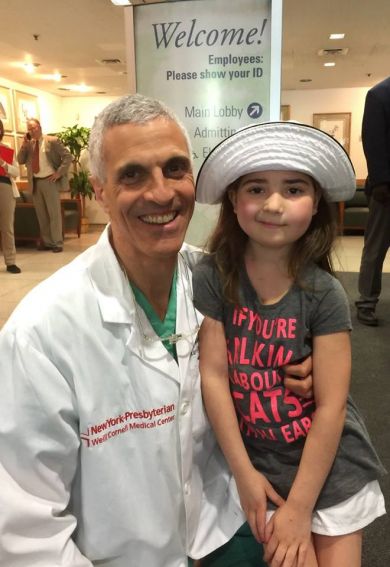Believe in Brooke: Finding peace with DIPG
Brooke Blake is in a battle to beat the odds. And the little warrior is just 8 years old.
Luckily, she has the support of her entire community, who recently rallied around her to run in an inaugural “Believe in Brooke and Beat DIPG” 5K held in Ridgefield, CT. The event attracted more than 500 participants, and raised nearly $100,000 to support the Children’s Brain Tumor Project at the Weill Cornell Brain and Spine Center.
It also raised awareness for the rare, deadly pediatric brain cancer, Diffuse Intrinsic Pontine Glioma (DIPG). DIPG is inoperable due to its location in the pons area of the brain stem; the “diffuse” in its name refers to the fact that it is also not a solid mass, so radiation is the only standard of treatment. There is no cure.
But Weill Cornell Medicine neurosurgeon Mark Souweidane, M.D., is trying to change that.
He is testing a new way of delivering drugs directly to the tumor site: convection-enhanced delivery (CED). Last month, he treated the final patient in his Phase I clinical trial, which received FDA approval in late 2011. Since then, 27 children – including Brooke -- have received infusions of a therapeutic agent called 124I-8H9, which consists of the 8H9 antibody (produced by mice and effective against many kinds of tumors) combined with the radioactive substance 124I.
The infusions were able to deliver the drug directly to the brain stem tumor and were not blocked by the body’s protective blood-brain barrier, which normally prevents chemotherapy drugs from crossing from the bloodstream into the brain in sufficient concentrations to attack a tumor. Dr. Souweidane was able to achieve concentrations of 1,000 times or more than what can be achieved with IV chemotherapy. He was also able to design and test new ways to measure those concentrations at the tumor site and monitor how long the drug stayed in the tumor.
Dr. Souweidane and his team will spend the next several months evaluating the data and preparing the results for publication. Other drugs and drug combinations are being tested to determine what the best agents are to infuse, and at what dose levels. The FDA also recently approved repeated treatments as an extension of the trial.
Brooke, the daughter of Matt and Maddie Blake of Ridgefield, was diagnosed in December and started treatments in May. While the tumor hasn’t disappeared, it has remained stable.
“My hope is that they can keep it stable and have that cure come along,” her mother told the Ridgefield Press. “Please help us end this horrible nightmare. “Let other families with this terrible diagnosis have a different experience than we did. Let them have a sense of hope instead of sitting there, scared, listening to the doctor – who is as scared as they are – as he explains what DIPG is.”
Follow her progress by joining The Believe in Brooke Facebook group.



